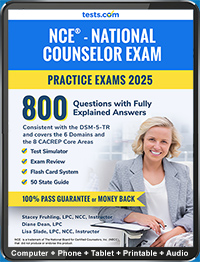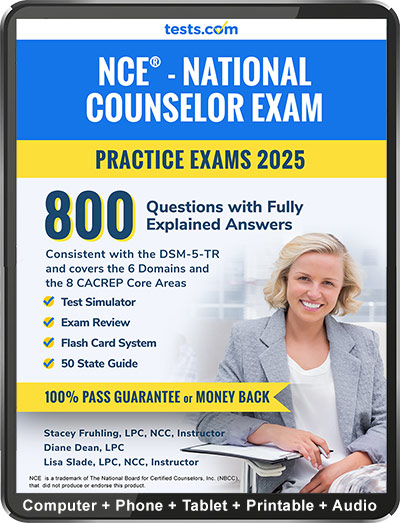North Carolina Counselor License Exam

To get licensed in North Carolina, Professional Counselors are required to take an exam covering such subjects as assessment and diagnosis, counseling and psychotherapy and professional ethics. Whether you live in Charlotte, Raleigh, Greensboro or another city or county, the resources below will help you get started on the path to receive your Professional Counselor’s license.
Need of a License: A license is needed to work as a counselor in North Carolina. Licenses are granted by the North Carolina Board of licensed and professional counselors.
To qualify to become a licensed professional counselor in North Carolina, the following must be met:
- Obtain a graduate degree in counseling from an accredited school meeting credit limits.
- Meet supervised clinical experience requirements of 2,000 hours of post-graduate professional counseling, defined as direct counseling experience with individuals groups, or families, including at least 100 hours of supervision. At least 75% of the supervision must be individual supervision; the remainder can be group supervision.
- An applicant must earn a passing score on the on the NCE (National Counselor Exam) or the National Clinical Mental Health Counselor Examination (NCMHCE) or the Certified Rehabilitation Counselor (CRC) exam.
- The Applicant must complete the North Carolina Jurisprudence exam.
How to Apply for Licensure
An application for licensure and other documentation can be obtained online. All documents can be submitted on line or must be sent to:
Board of Licensed Professional Counselors
P.O. Box 77819
Greensboro, NC 27417
1- 844-622-3572 or 336/217-6007
1- 336-217-9450 (fax)
Test Content of the NCE
The NCE consists of 200 multiple-choice questions and is administered over a four-hour period. The NCE covers the following six knowledge, skill and task domains:
- Professional Practice and Ethics
- Intake, Assessment and Diagnosis
- Areas of Clinical Focus
- Treatment Planning
- Counseling Skills and Interventions
- Core Counseling Attributes
The questions are aligned to the following CACREP Common Core Areas:
- Human Growth and Development
- Social and Cultural Diversity
- Counseling and Helping Relationships
- Group Counseling and Group Work
- Career Development
- Assessment and Testing
- Research and Program Evaluation
- Professional Orientation and Ethical Practice
For more information, see the NCE Candidate Handbook.
How to Apply to Take the Exam
Apply online to take the NCE.
Test content of the NCMHCE
The test format comprises of 12 to 14 case studies. Each case study is followed by 10 multiple-choice questions, divided into counseling phases: the intake and assessment phase, the first follow-up counseling session, and the second follow-up counseling session. Candidates will have one hour and 45 minutes to complete the exam.
Six different counseling domains will be addressed throughout these case simulations, to include:
- Intake, Assessment, and Diagnosis
- Treatment Planning
- Counseling Skills and Interventions
- Professional Practice and Ethics
- Core Counseling Attributes
- Areas of Clinical Focus, which is the given information provided in each case study
For more information, see the NCMHCE Candidate Handbook.
How to Apply to Take the Exam
Apply online to take the NCMHCE.
The state of North Carolina will also accept a passing score on the CRC exam.
Test content of the CRC
The CRC exam is composed of questions measuring 10 knowledge domains of rehabilitation counseling, each of which is subdivided into subdomains:
- Assessment, Appraisal, and Vocational Evaluation
- Job Development, Job Placement, and Career/Lifestyle Development
- Vocational Consultation and Services for Employers
- Case Management, Professional Roles and Practices, and Utilizing Community Resources
- Fundamental Counseling principles, Professional Orientation and ethics, counseling theories, Social and Cultural Issues, and Human Growth and Development
- Principles of Group and Family Counseling
- Principles of Mental Health Counseling
- Medical/ Functional/Psychosocial Aspects of Disability
- Management of Disability
- Research, Program Evaluation, and Evidence-Based Practice
CRC Exam Structure
The CRC Exam consists of 175 multiple-choice questions. The applicant is allowed three hours and 30 minutes to complete the exam, within an eight day testing window. It is recommended that applicants reserve four hours for time to check in, review test instructions, and a tutorial to become familiar with using the computer test system.
CRC Exam Scoring
The CRC Exam is scored based on two components: the applicant’s knowledge of counseling, and rehabilitation and disability. Both parts must earn a passing score,
How to Apply to Take the Exam
You can find the registration information and the CRC application and other documents online, or write:
Commission on Rehabilitation Counselor Certification
1699 E. Woodfield Road
Suite 300
Schaumburg, IL 60173
Phone: 847-944-1325
Fax: 847-944-1346
info@crccertification.com.
Test content of the NC Jurisprudence exam
The NC Jurisprudence exam covers the following ethical and legal topics pertinent to licensed counselors:
- Working with Clients in Facilities (Inpatient or Incarcerated)
- Code of Ethics for counselors
- Client Confidentiality and Disclosure, and limits thereof
- Continuing Education requirements
- Graduate Counseling Experience requirements
- Involuntary Commitment of clients
- Licensed Professional Counselor role and duties
- Licensed Professional Counselor Supervisor role and duties
- Counseling Minors
- Professional Relationships – Professional Corporations, Direct Solicitation, Referral Fees, and Sanctions
- Professional Relationships – Sexual Relationships with clients
- Record keeping/Documentation
- Use of Social Media and Professional Counseling
- Substance Abuse specific ethics
License Renewal and Continuing Education Requirements
To renew a license, regulations require 40 clock hours of continuing education in acceptable courses and programs offered by approved Continuing Education providers, to be completed every two year renewal period. This must include at least three hours in professional ethics.



